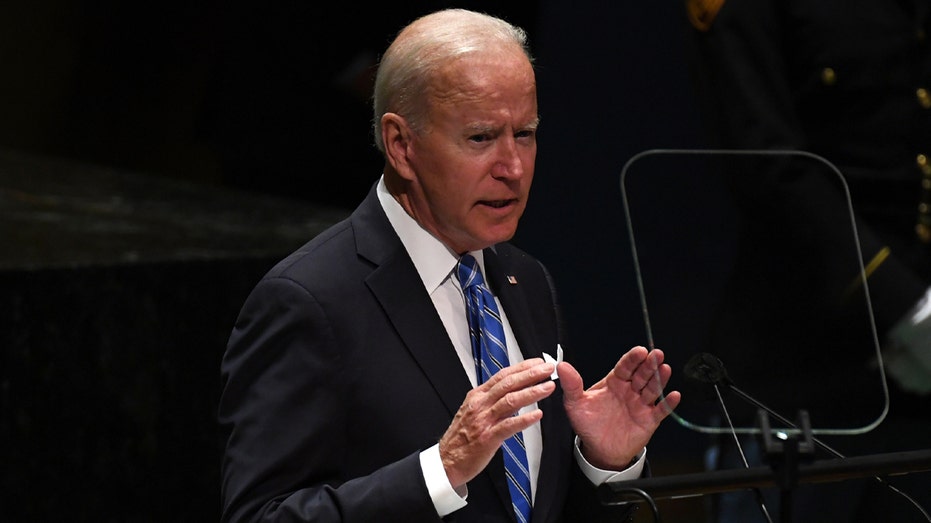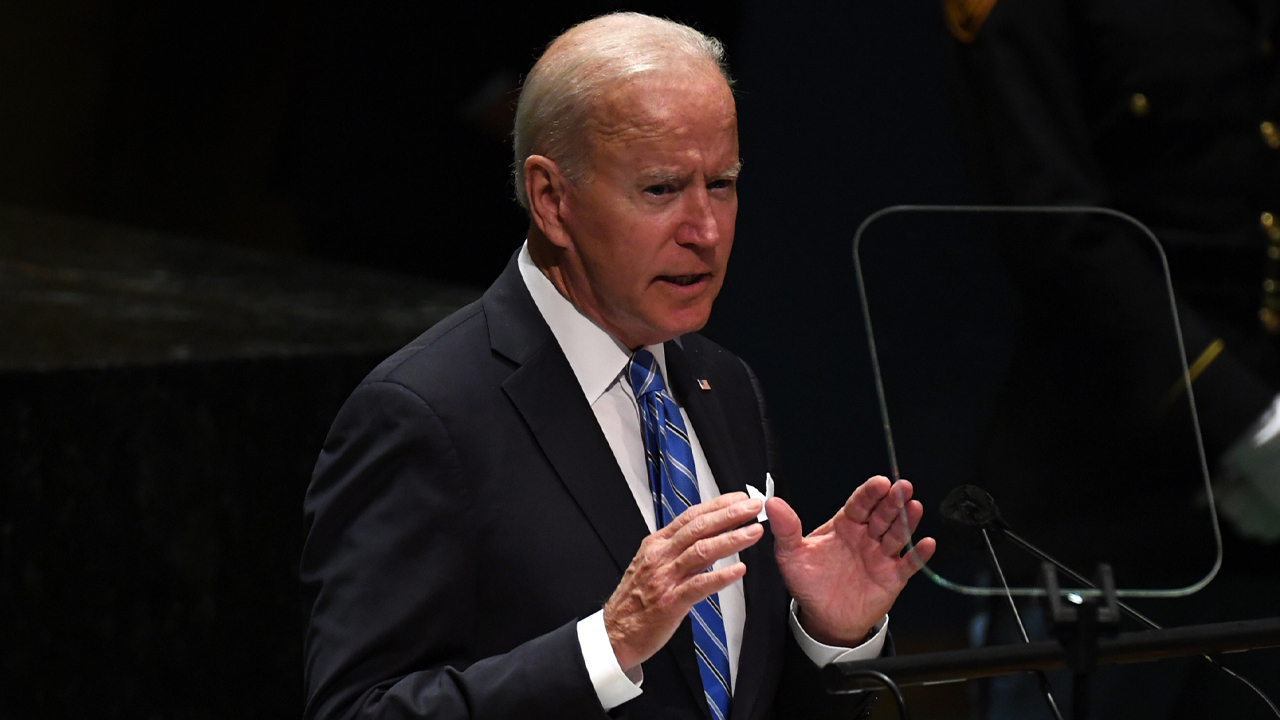Drugmakers gear up for price restrictions in Biden’s legislative agenda
Industry potentially faces significant expansion of government regulation despite success in watering down Democratic proposals
Fox Business Flash top headlines for November 24
Check out what's clicking on FoxBusiness.com.
The pharmaceutical industry is bracing for the most significant expansion of government regulation of drug prices in decades despite success in watering down proposals from congressional Democrats that would have gone much further.
The House last week approved a roughly $2 trillion social-spending and climate bill supported by President Biden that requires the government to negotiate prices for some older high-cost medicines covered by Medicare. The bill also caps annual drug price increases at the rate of inflation. The measures reduce federal drug spending—and industry revenue—by $128 billion over 10 years, according to the Congressional Budget Office.
Yet drugmakers avoided proposals that would have hit harder, according to congressional staffers and lobbyists. So far the industry hasn’t mobilized in force against the bill after its passage in the House, though some industry officials hope Senate Republicans might derail some parts of the package.
CALIFORNIA JUDGE RULES FOR DRUGMAKERS IN OPIOID LAWSUIT

President Joe Biden addresses the 76th Session of the U.N. General Assembly on September 21, 2021 at U.N. headquarters in New York City. (Photo by Timothy A. Clary-Pool/Getty Images) ((Photo by Timothy A. Clary-Pool/Getty Images) / Getty Images)
"Compared to some of the pre-pandemic proposals, this law is substantially better," Leonard Schleifer, chief executive officer of Regeneron Pharmaceuticals Inc., REGN -0.18% said.
The company’s vision-loss drug Eylea, which had $2.9 billion in Medicare sales in 2019, could be among the first products to face negotiation. Dr. Schleifer said he objected to negotiation because lower prices could hamper drugmakers’ ability to invest in new drug technologies.
The Senate plans to take up the bill in December. Few changes are expected to be made to the drug-pricing provisions, which were hammered out in a compromise pact among Democratic lawmakers earlier this month, according to people familiar with the matter.
Democrats are seeking to pass the bill through a process called budget reconciliation to bypass GOP opposition.
The industry’s best chance of dodging the new regulations is if Senate Republicans try to employ parliamentary procedures to strike nonbudgetary measures from the bill, people familiar with the matter said.
After years of bipartisan efforts to rein in drug prices, analysts said the bill will have a relatively limited impact on the industry. Under the proposals, companies will retain the power to set new prices on new products and only face negotiation on drugs that are big sellers long after their launch.
The bill reduces how much seniors covered by Medicare are required to pay out of their own pockets for prescriptions, which could encourage greater use of high-price medicines.
"The impact here is very modest," said Ronny Gal, a Bernstein analyst, who estimated a total reduction in industry revenue of 3% to 5%. "They exchange one year of growth in exchange for a decade of no action at the federal legislative level on drug prices. That is a very good compromise for the drug industry."
The package opens the door to further government drug price negotiations in the future. Industry executives voiced opposition to the negotiation provision in particular, saying the government has too much purchasing power for there to be a true negotiation.
Under the bill, a 95% excise tax would be levied on sales of drugs for which companies refuse to negotiate.
Medicare price negotiation is "price-fixing, clearly," Pfizer Inc. PFE -0.37% Chief Executive Albert Bourla said. "The way they think about it is, we tell you what the price is, and if you agree it’s fine, if you don’t agree, we will give you a fine of 95%. I don’t see that as negotiating."
Government drug price negotiation is overwhelmingly popular among Republican and Democratic voters, according to opinion polls. Lawmakers from both parties have attacked the costs, but the industry has been successful over the years in fending off legislative proposals.
Recent industry lobbying over the House bill helped pare back more-aggressive proposals to give the government a freer hand in negotiating a larger number of products, according to people familiar with the matter.
The bill directs the Health and Human Services Department to negotiate prices for 10 drugs starting in 2025 and then to increase the number of negotiated drugs each year afterward; by 2030, 100 drugs would have negotiated prices.
Negotiations are only allowed for the biggest-selling drugs in Medicare that have no generic competition and have been on the market for several years. The most commonly used medicines dispensed at local pharmacies, such as the blood thinner Eliquis, are eligible after nine years.
MARK CUBAN-OWNED COMPANY LAUNCHES PHARMACY-BENEFIT MANAGER
So-called biological drugs made from living cells, such as the rheumatoid arthritis treatment Humira, are eligible 13 years after launch.
In addition, all insulin products for diabetes are eligible for negotiation, and monthly copays are capped at $35 for patients on Medicare and private insurance.
The legislation would change the calculus of drug-pricing beyond federal programs such as Medicare.
The inflation-cap on price increases applies to the entire U.S. drug market, including private and employer health-insurance programs. Any revenue companies earn from price increases above consumer inflation would be forfeited to the government in the form of rebates.
The measure would effectively end the practice of big companies using price increases on older drugs to boost revenue growth. The cap would save Medicare $49.4 billion in drug spending over 10 years, according to the CBO.
In the private sector, the cap on price increases would reduce overall drug spending and lead employers to lower insurance premiums, said Paul Masi, chief of the CBO’s Medicare Cost Estimates Unit. As a consequence, employers would claim lower tax deductions for their employee health-insurance programs, boosting federal tax revenue by $34.2 billion, according to the CBO.
"It is better to place the financial rewards on true innovation rather than just price increases," Dr. Schleifer said. "Exorbitant price increases are bad for the industry; they give us a bad reputation."
Drugmakers are likely to respond to the cap by setting higher prices for their newly approved drugs at launch, said Loren Adler, associate director of the USC-Brookings Schaeffer Initiative for Health Policy.
CLICK HERE TO READ MORE FROM FOX BUSINESS
The CBO estimates that five fewer drugs would be introduced over the next 30 years as a result of the bill, out of a total of 1,300 it projects would come on the market.
—Jared S. Hopkins contributed to this article.




















